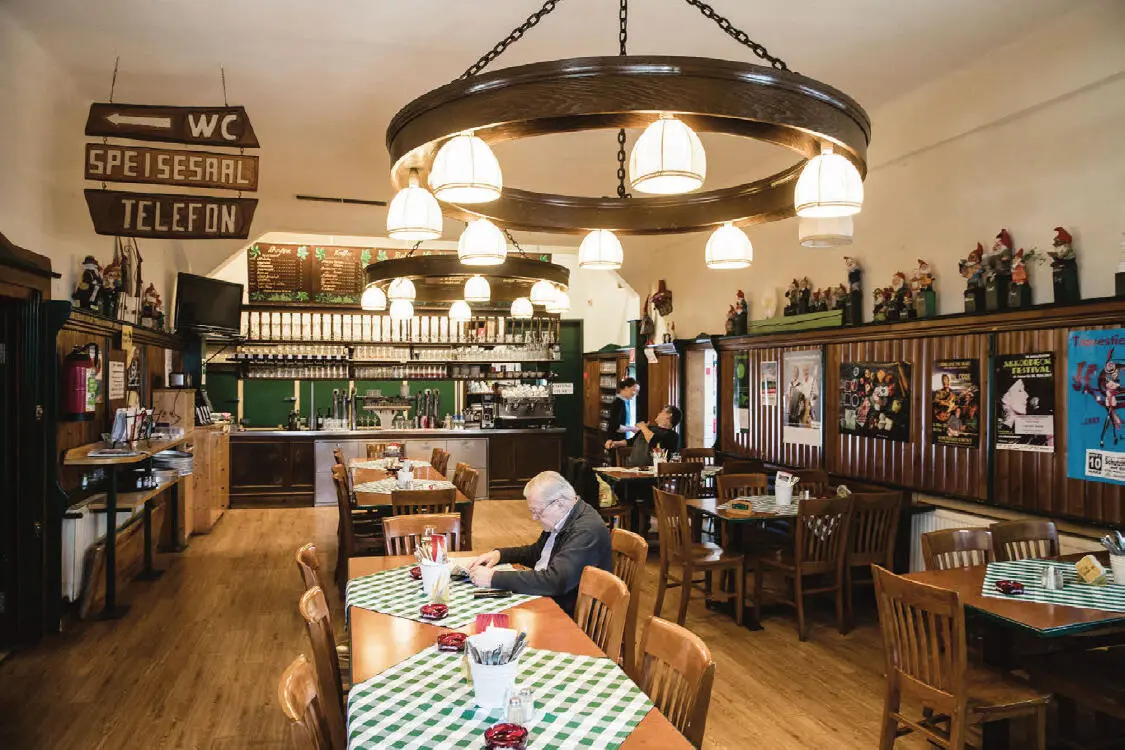Over at the Schmelz im Schutzhaus, Willi cleans a rib of pork three times a week. He removes the bones and tendons and divides the meat up into correctly sized “butterfly cuts”. Because veal is not used, the correct designation on the menu is “Wiener Schnitzel made of pork”. Didi the waiter takes the food out as soon as guests have secured a place at one of the numerous tables under the old chestnut trees out in the restaurant’s huge outdoor seating area. Didi is also prone to offering a hug if he is in the mood. Some of Vienna’s leading entertainers may well be encountered here, such as the folk singer Horst Chmela, the Hans Ecker Trio, and members of the band “Die Hinichen”. One may also run into Harry Prünster, who used to be a major TV star. When such people perform, they need schnitzel.
At the edge of the garden, an 80 year-old lady has sat down with her even older husband, a keen chess player. They are perusing the menus. “How many schnitzel can one person put away in a lifetime?” asks the husband. “A lot!” his wife replies. Pork schnitzel and chicken schnitzel are both charged at €9.50. The sous-chef explains that the ordering ratio is 60:40 in favour of the former. He does not think that the guests here can be expected to pay more than 15 to 16 euro per head for a meal. Veal cannot be offered for under €20, and this is also a reason why the restaurant does not serve it.
“We didn’t feel like cooking at home today,” states the cheery elderly couple. They have now been on Earth for a combined total of over 160 years and estimate that they have eaten “a very, very large amount of schnitzel” during this period. Although the sprightly wife naturally has no equal when it comes to preparing the dish at home, she is also happy to avoid false envy and admit that her husband has also mastered the technique. In chess, a draw would be agreed in such a situation. They have tried every variety of schnitzel during their lives, and each one has been outstanding. Over the years, however, the husband has developed a certain proclivity for schnitzel made from cured meat. “Somehow it just tastes a bit tangier!” He orders one now.
This will be cooked by Willi. The song “It’s not easy” is playing on the kitchen radio, but he has long since perfected the art of baking the perfect schnitzel. The preparatory stages are also second nature, even though every schnitzel needs to be cooked from scratch and requires a separate effort. Willi’s schnitzel beater has left a hefty dent in the robust-looking chopping block over the course of recent years. Pork and chicken fillets are cut to a size of 220 grams and 240 grams respectively before being placed into the hot oil. Willi learned his trade at the Gartenhotel Altmannsdorf, which belonged to the SPÖ, one of Austria’s main two political parties. The SPÖ is now having its own problems attracting votes in the suburbs, but Chancellor Franz Vranitzky was always exceptionally pleased with the schnitzels Willi produced. It goes without saying that the guests here are too.
Up to fifteen kilos of delicious potato salad are sold on very good days. When business is so brisk, five or six waiters are kept on their toes as they serve between 50 and 80 schnitzels each. Willi might therefore make up to 400 schnitzels a day. Sometimes the coating might be “a little lighter” and sometimes “a little darker”. These are the special requests with which he needs to contend. When the schnitzel orders really come flooding in, each waiter also needs his own assistant to help balance the trays to as they are carried between the tables, through the dining hall or across the veranda. Guests tend to start turning up at 11.00 am. May and June are the busiest months, but the inhabitants of the suburbs may also crave schnitzel during the heat of July and August. “It’s never really too hot for a schnitzel,” says Willi. Guests will simply order an extra beer to compensate for the dehydration. If necessary, the classic marinade can also be finished off. And the man who went abroad will spend the long nights asking himself why he didn’t remain in the suburbs, where he could eat schnitzel with his colleagues very single day.

A classic example of an inn in the Viennese suburbs – the “Schutzhaus zur Zukunft” in Fünfhaus
“Its never really too hot for a schnitzel!“
HEAD CHEF WILLI FROM
THE SCHUTZHAUS ZUR ZUKUNFT,
1150 VIENNA
Breaded schnitzel with cucumber salad

ALFRED POLGAR
The legendary columnist of pre-war Vienna Alfred Polgar explains why the Wiener Schnitzel brings dinners together in human kindness, especially when paired with cucumber salad .
There is truth in wine, but good food brings forth love. A drunk speaks from the heart, people who are satiated by food suddenly have a heart that they did not have before. They are overcome by the joy of understanding and by a desire for justice. Bridges of sympathy make connections both near and far. A pink mist curtails distances and covers up abysses. Man becomes good. Their tongues convert the calories they have taken on board into chatter. They behave differently from the tongue of a drunkard, which spills out content from a full bowl of consciousness and reveals what lay at its bottom.
The laws governing the psychological impact of good food go hand in hand (or rather soul in stomach) with the physical being. They are puzzling and impenetrable, but a few constantly recurring basic types do exist.
Breaded schnitzel with cucumber salad, for example, fosters the development of a kind of glue for the mind. This brings the table together to form a symbolic unit. Some eaters sense this unity so strongly that they feel a need to preserve it beyond the fleeting hour of dining. This sort of person is touched by human kindness before the soup course is over. By the main course, an invitation for a home visit will have been issued to all those present. Arrangements for joint holidays will be finalised over the cheese, and these plans will be extended to cover the whole of a lifetime whilst the company is drinking their black coffee.
The familiar counterpart to this type of figure is the pessimistic glutton. In this case, moral over-compensation for bodily enjoyment leads to a prevailing mood which is characterised by moodiness and bitterness. This type of person feels that the joy of eating has infringed the ethical laws. A sense of gloom is produced in order to satisfy any injury given. They are ashamed to be savouring their food and tend to show the displeasure they take in such pleasure. If you ask them: “Would you like compote or salad?”, they will respond caustically: “This issue was already settled in the Communist Manifesto.” They will then help themselves to both.
There is another very peculiar type of reaction to good food. In this case, and without being encouraged and provoked in any way, persons eating will give their views on a range of matters on which they actually hold no opinion at all. Out of the blue, and without having been led to the topic by previous association, they will say something like: “X has the loveliest voice of all female soprano concert singers.” It is not true that X has the best soprano voice, but this does not matter. The person might equally have said: “She has the ugliest soprano voice” or “She is the worst female bass singer.” The point is not to express an opinion but merely to provide some kind of intellectual food to chew on . It is simply a question of producing speech sounds.
Читать дальше














